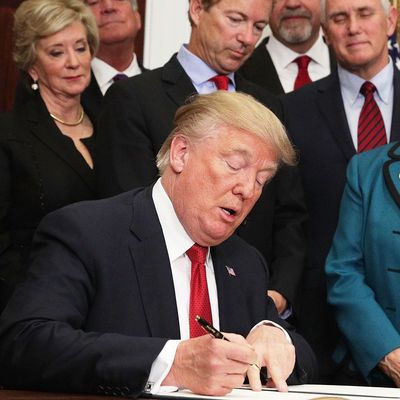
Tax reform is a principle that, in the abstract, commands support from economists on both the left and the right. The theory holds that the quality of the tax code tends to degrade over time, as clever tax lawyers discover new loopholes, and powerful business interests use their influence to gain special treatment. A poorly designed tax code will encourage people to structure their activities around obtaining favorable tax rates, rather than following market signals. Tax reform is understood as a good-government initiative to remove political favoritism from the tax code and put different forms of economic activity on an even footing.
The 1986 Tax Reform Act, a bipartisan agreement signed by Ronald Reagan, is the paradigmatic case of well-designed tax reform. Republicans have cast their bill as the heir to this tradition, and media coverage has often echoed their framing. Republicans are pursuing “a once-in-a-generation opportunity to clean up an inefficient, loophole-cluttered tax code,” reported the Associated Press last month. But the bills Republicans have passed in each chamber are not “tax reform” in any meaningful sense of the term. They are the precise opposite of it.
Rather than removing political interference from the tax code, the Republicans instead set out to create more of it. The bill was designed by corporate lobbyists and Republican partisans, rewarding pro-Republican business interests and punitively targeting politically hostile ones. “It’s death to Democrats,” gloats Trump adviser Stephen Moore, with more than a touch of hyperbole. “They go after state and local taxes, which weakens public employee unions. They go after university endowments, and universities have become playpens of the left.”
Meanwhile, the bill lavishes rewards on industries friendly to the Republican majority. Oil and gas receive favorable treatment at the expense of renewable energy. Real estate — perhaps not coincidentally, the Trump family business — makes out like a bandit.
The haste with which the bills have been written and passed, combined with the unchecked influence of lobbyists, has resulted in a complex blizzard rife with loopholes. “Suddenly, there are a dozen different tax rates that apply to different businesses, in different industries, and to different investments,” Adam Looney, a former Treasury Department official, tells the New York Times. “The speed with which they’re doing this creates a level of ambiguity that will keep tax lawyers and tax professionals busy for 20 years,” adds tax lawyer Scott D. Michel. The proliferation of rates creates unlimited opportunities for gamesmanship.
The most tempting opportunity for gamesmanship is right in the open. The “pass-through” tax break is an invitation for high-income earners to reclassify themselves as corporations in order to enjoy lower individual tax rates. Tax lawyers are giddy. “This is an entirely new concept and, from a tax lawyer’s perspective, it’s like a new paint box,” David Miller, a tax partner at Proskauer Rose LLP, tells Politico’s Brian Faler. “We have a new tool to play with.”
Sheer haste and technical incompetence will mean that some of the financial benefits to the rich and well-lawyered will be offset by the costs of figuring out how the law even works. These quotes to Politico from Republican sources are jaw-dropping. “The more you read, the more you go, ‘Holy crap, what’s this?’” says Greg Jenner, a former top tax official in George W. Bush’s Treasury Department. “We will be dealing with unintended consequences for months to come because the bill is moving too fast.” Another Republican lobbyist says, “It’s crazy. I don’t think anyone could explain it, let alone comply with it” by the time it takes effect.
This is not a description of a compromised or watered-down effort to reform the tax code. It is a description of a bill performing the opposite function of tax reform. The bill may not be the death of democracy or mortal peril to the economic expansion. But it is, at best, a messy helicopter drop of cash on corporate America. The cleanup will take years.






























